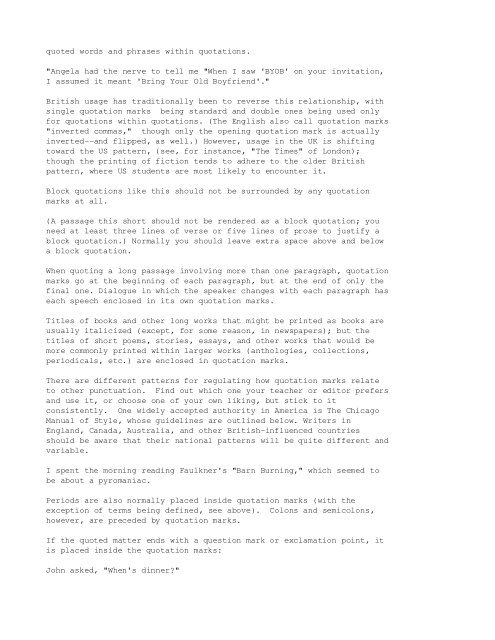Common_Errors_in_English_usage
Common_Errors_in_English_usage
Common_Errors_in_English_usage
Create successful ePaper yourself
Turn your PDF publications into a flip-book with our unique Google optimized e-Paper software.
quoted words and phrases with<strong>in</strong> quotations.<br />
"Angela had the nerve to tell me "When I saw 'BYOB' on your <strong>in</strong>vitation,<br />
I assumed it meant 'Br<strong>in</strong>g Your Old Boyfriend'."<br />
British <strong>usage</strong> has traditionally been to reverse this relationship, with<br />
s<strong>in</strong>gle quotation marks be<strong>in</strong>g standard and double ones be<strong>in</strong>g used only<br />
for quotations with<strong>in</strong> quotations. (The <strong>English</strong> also call quotation marks<br />
"<strong>in</strong>verted commas," though only the open<strong>in</strong>g quotation mark is actually<br />
<strong>in</strong>vertedand flipped, as well.) However, <strong>usage</strong> <strong>in</strong> the UK is shift<strong>in</strong>g<br />
toward the US pattern, (see, for <strong>in</strong>stance, "The Times" of London);<br />
though the pr<strong>in</strong>t<strong>in</strong>g of fiction tends to adhere to the older British<br />
pattern, where US students are most likely to encounter it.<br />
Block quotations like this should not be surrounded by any quotation<br />
marks at all.<br />
(A passage this short should not be rendered as a block quotation; you<br />
need at least three l<strong>in</strong>es of verse or five l<strong>in</strong>es of prose to justify a<br />
block quotation.) Normally you should leave extra space above and below<br />
a block quotation.<br />
When quot<strong>in</strong>g a long passage <strong>in</strong>volv<strong>in</strong>g more than one paragraph, quotation<br />
marks go at the beg<strong>in</strong>n<strong>in</strong>g of each paragraph, but at the end of only the<br />
f<strong>in</strong>al one. Dialogue <strong>in</strong> which the speaker changes with each paragraph has<br />
each speech enclosed <strong>in</strong> its own quotation marks.<br />
Titles of books and other long works that might be pr<strong>in</strong>ted as books are<br />
usually italicized (except, for some reason, <strong>in</strong> newspapers); but the<br />
titles of short poems, stories, essays, and other works that would be<br />
more commonly pr<strong>in</strong>ted with<strong>in</strong> larger works (anthologies, collections,<br />
periodicals, etc.) are enclosed <strong>in</strong> quotation marks.<br />
There are different patterns for regulat<strong>in</strong>g how quotation marks relate<br />
to other punctuation. F<strong>in</strong>d out which one your teacher or editor prefers<br />
and use it, or choose one of your own lik<strong>in</strong>g, but stick to it<br />
consistently. One widely accepted authority <strong>in</strong> America is The Chicago<br />
Manual of Style, whose guidel<strong>in</strong>es are outl<strong>in</strong>ed below. Writers <strong>in</strong><br />
England, Canada, Australia, and other British<strong>in</strong>fluenced countries<br />
should be aware that their national patterns will be quite different and<br />
variable.<br />
I spent the morn<strong>in</strong>g read<strong>in</strong>g Faulkner's "Barn Burn<strong>in</strong>g," which seemed to<br />
be about a pyromaniac.<br />
Periods are also normally placed <strong>in</strong>side quotation marks (with the<br />
exception of terms be<strong>in</strong>g def<strong>in</strong>ed, see above). Colons and semicolons,<br />
however, are preceded by quotation marks.<br />
If the quoted matter ends with a question mark or exclamation po<strong>in</strong>t, it<br />
is placed <strong>in</strong>side the quotation marks:<br />
John asked, "When's d<strong>in</strong>ner?"





